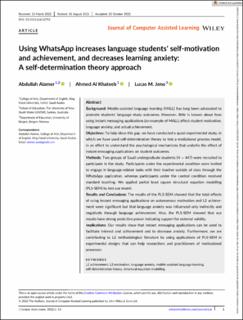| dc.contributor.author | Alamer, Abdullah | |
| dc.contributor.author | Al Khateeb, Ahmed | |
| dc.contributor.author | Jeno, Lucas Matias | |
| dc.date.accessioned | 2023-02-09T12:48:39Z | |
| dc.date.available | 2023-02-09T12:48:39Z | |
| dc.date.created | 2022-11-24T10:02:11Z | |
| dc.date.issued | 2022 | |
| dc.identifier.issn | 0266-4909 | |
| dc.identifier.uri | https://hdl.handle.net/11250/3049726 | |
| dc.description.abstract | Background
Mobile-assisted language learning (MALL) has long been advocated to promote students' language study outcomes. However, little is known about how using instant messaging applications (an example of MALL) affect student motivation, language anxiety, and actual achievement.
Objectives
To help close this gap, we have conducted a quasi-experimental study, in which we have used self-determination theory to test a mediational process model, in an effort to understand the psychological mechanisms that underlie the effect of instant messaging applications on student outcomes.
Methods
Two groups of Saudi undergraduate students (N = 447) were recruited to participate in the study. Participants under the experimental condition were invited to engage in language-related tasks with their teacher outside of class through the WhatsApp application, whereas participants under the control condition received standard teaching. We applied partial least square structural equation modelling (PLS-SEM) to test our model.
Results and Conclusions
The results of the PLS-SEM showed that the total effects of using instant messaging applications on autonomous motivation and L2 achievement were significant but that language anxiety was influenced only indirectly and negatively through language achievement. Also, the PLS-SEM showed that our results have strong predcitive power indicating support for external validity.
Implications
Our results show that instant messaging applications can be used to facilitate interest and achievement and to decrease anxiety. Furthermore, we are contributing to L2 methodological literature by using applications of PLS-SEM in experimental designs that can help researchers and practitioners of motivational processes. | en_US |
| dc.language.iso | eng | en_US |
| dc.publisher | Wiley | en_US |
| dc.rights | Navngivelse 4.0 Internasjonal | * |
| dc.rights.uri | http://creativecommons.org/licenses/by/4.0/deed.no | * |
| dc.title | Using WhatsApp increases language students' self-motivation and achievement, and decreases learning anxiety: A self-determination theory approach | en_US |
| dc.type | Journal article | en_US |
| dc.type | Peer reviewed | en_US |
| dc.description.version | publishedVersion | en_US |
| dc.rights.holder | Copyright 2022 The Author(s) | en_US |
| cristin.ispublished | true | |
| cristin.fulltext | original | |
| cristin.qualitycode | 2 | |
| dc.identifier.doi | 10.1111/jcal.12753 | |
| dc.identifier.cristin | 2079765 | |
| dc.source.journal | Journal of Computer Assisted Learning | en_US |
| dc.identifier.citation | Journal of Computer Assisted Learning. 2022. | en_US |

